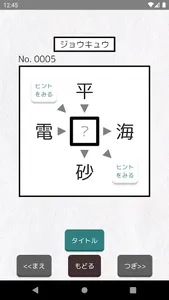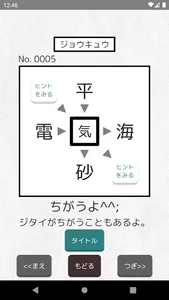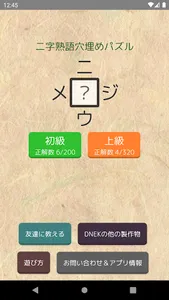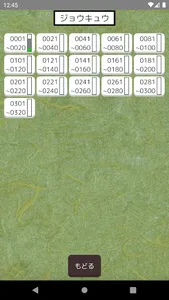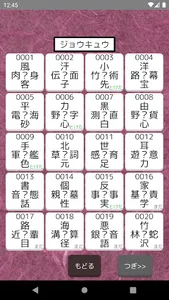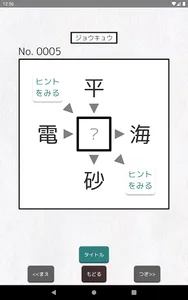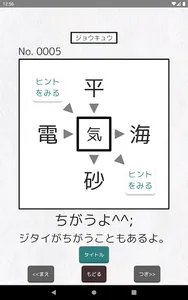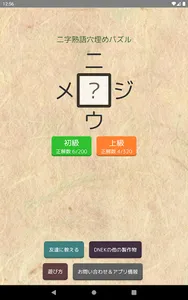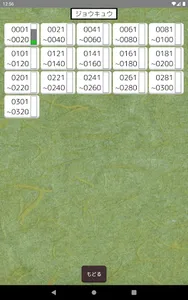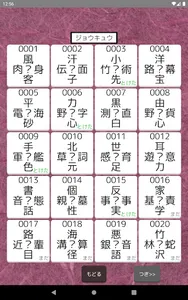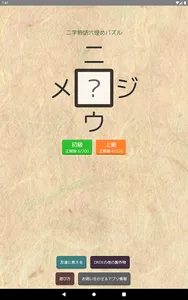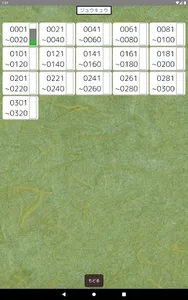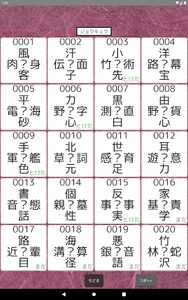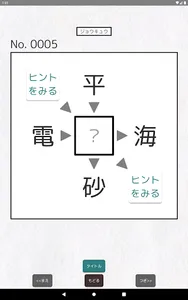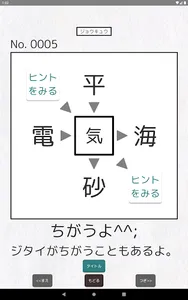□ What is "Nijiume"?
"Nijiume" is a puzzle that guesses one kanji that goes into the center of the cross so that four two-character idioms are completed.
It is a classic kanji puzzle that is also called "Wadokaichin" because of its shape.
□ The secret of fun □
This puzzle can be easily created by deciding the idioms appropriately or automatically generating them, but it tends to be easy to understand the answer or multiple answers (multiple answers).
However, the problems presented by this app are good and difficult questions that are worth solving because they are carefully created by Kyoto University students who have Kanji Kentei Level 1.
□ Level divided into beginner and advanced □
At first, all the problems were difficult, but we have set up a new beginner's edition so that more people can enjoy it.
Even if you are a beginner, there are a lot of solvable problems that make you feel a little confused, so you shouldn't underestimate them.
Of course, we will continue to add advanced questions for those who want to challenge difficult questions.
□ Tips when jammed □
You can use hints when you can't think of just four letters, up, down, left, and right.
You can display one additional character at the top left and one at the bottom right, so use it when you get stuck.
□ Convenient search function □
Also, if you have a two-character compound word that you know the answer but don't know the meaning of, you can tap the kanji to search for the meaning immediately.
□ Save / display answer status □
For each question, you can see whether it is a question you have already seen or a question you have already answered correctly.
□ Vocabulary to be asked □
Beginner's questions use generally used vocabulary, so you can increase and confirm useful knowledge for social life while solving the problems.
On the other hand, many advanced problems are more difficult than the general "Wadokaichin".
There are old idioms and new idioms, and the fields range from everyday words and slang to mathematics, chemistry, economics, and linguistics, so a wide range of vocabulary and creativity to bring them out are required.
Of course, even if you don't understand one or two idioms, you can search after solving them using other kanji and hints as clues to further expand your insight.
********
□ Criteria for selecting idioms □
Idioms or words are difficult to define, and there are various theories, but in this application, we use idioms that generally meet all of the following criteria in terms of "creator's subjectivity".
・ The frequency of use is recognized to the extent that it is listed in medium-sized Japanese dictionaries (Kojien, etc.) (including new words and slang words that are permitted to be used to the same extent even if they are not listed yet).
(Example) "Face art", "company slave", etc. are acceptable
・ Place names are accepted if they have a certain degree of name recognition.
(Example) "Arashiyama", "Arakawa", "Mt. Tsurugi", etc. are acceptable
・ Do not use personal names and numbers unless they are common nouns.
(Example) "Ingen", "Ikki", "Four seasons", etc. are acceptable
・ Pronouns, adverbs, and loanwords are accepted as long as they are two kanji characters.
(Example) "My person", "During", "Gas", "Pari", etc. are acceptable
・ Abbreviations are accepted if the abbreviations are well established.
(Example) "Job quality (= job question)", "Manga cafe (= manga cafe)", etc. are acceptable
・ Do not use reduplication
(Example) "Various", "Daily", etc. are not possible
□ About deficiencies in the problem □
We take great care in creating the problem, but if you think you have found a multiple solution, sorry to trouble you, but to avoid spoilers to other people, the email address at the bottom of the page or the creator Please contact the direct message of your Twitter account (@dnek_).
"Nijiume" is a puzzle that guesses one kanji that goes into the center of the cross so that four two-character idioms are completed.
It is a classic kanji puzzle that is also called "Wadokaichin" because of its shape.
□ The secret of fun □
This puzzle can be easily created by deciding the idioms appropriately or automatically generating them, but it tends to be easy to understand the answer or multiple answers (multiple answers).
However, the problems presented by this app are good and difficult questions that are worth solving because they are carefully created by Kyoto University students who have Kanji Kentei Level 1.
□ Level divided into beginner and advanced □
At first, all the problems were difficult, but we have set up a new beginner's edition so that more people can enjoy it.
Even if you are a beginner, there are a lot of solvable problems that make you feel a little confused, so you shouldn't underestimate them.
Of course, we will continue to add advanced questions for those who want to challenge difficult questions.
□ Tips when jammed □
You can use hints when you can't think of just four letters, up, down, left, and right.
You can display one additional character at the top left and one at the bottom right, so use it when you get stuck.
□ Convenient search function □
Also, if you have a two-character compound word that you know the answer but don't know the meaning of, you can tap the kanji to search for the meaning immediately.
□ Save / display answer status □
For each question, you can see whether it is a question you have already seen or a question you have already answered correctly.
□ Vocabulary to be asked □
Beginner's questions use generally used vocabulary, so you can increase and confirm useful knowledge for social life while solving the problems.
On the other hand, many advanced problems are more difficult than the general "Wadokaichin".
There are old idioms and new idioms, and the fields range from everyday words and slang to mathematics, chemistry, economics, and linguistics, so a wide range of vocabulary and creativity to bring them out are required.
Of course, even if you don't understand one or two idioms, you can search after solving them using other kanji and hints as clues to further expand your insight.
********
□ Criteria for selecting idioms □
Idioms or words are difficult to define, and there are various theories, but in this application, we use idioms that generally meet all of the following criteria in terms of "creator's subjectivity".
・ The frequency of use is recognized to the extent that it is listed in medium-sized Japanese dictionaries (Kojien, etc.) (including new words and slang words that are permitted to be used to the same extent even if they are not listed yet).
(Example) "Face art", "company slave", etc. are acceptable
・ Place names are accepted if they have a certain degree of name recognition.
(Example) "Arashiyama", "Arakawa", "Mt. Tsurugi", etc. are acceptable
・ Do not use personal names and numbers unless they are common nouns.
(Example) "Ingen", "Ikki", "Four seasons", etc. are acceptable
・ Pronouns, adverbs, and loanwords are accepted as long as they are two kanji characters.
(Example) "My person", "During", "Gas", "Pari", etc. are acceptable
・ Abbreviations are accepted if the abbreviations are well established.
(Example) "Job quality (= job question)", "Manga cafe (= manga cafe)", etc. are acceptable
・ Do not use reduplication
(Example) "Various", "Daily", etc. are not possible
□ About deficiencies in the problem □
We take great care in creating the problem, but if you think you have found a multiple solution, sorry to trouble you, but to avoid spoilers to other people, the email address at the bottom of the page or the creator Please contact the direct message of your Twitter account (@dnek_).
Show More
